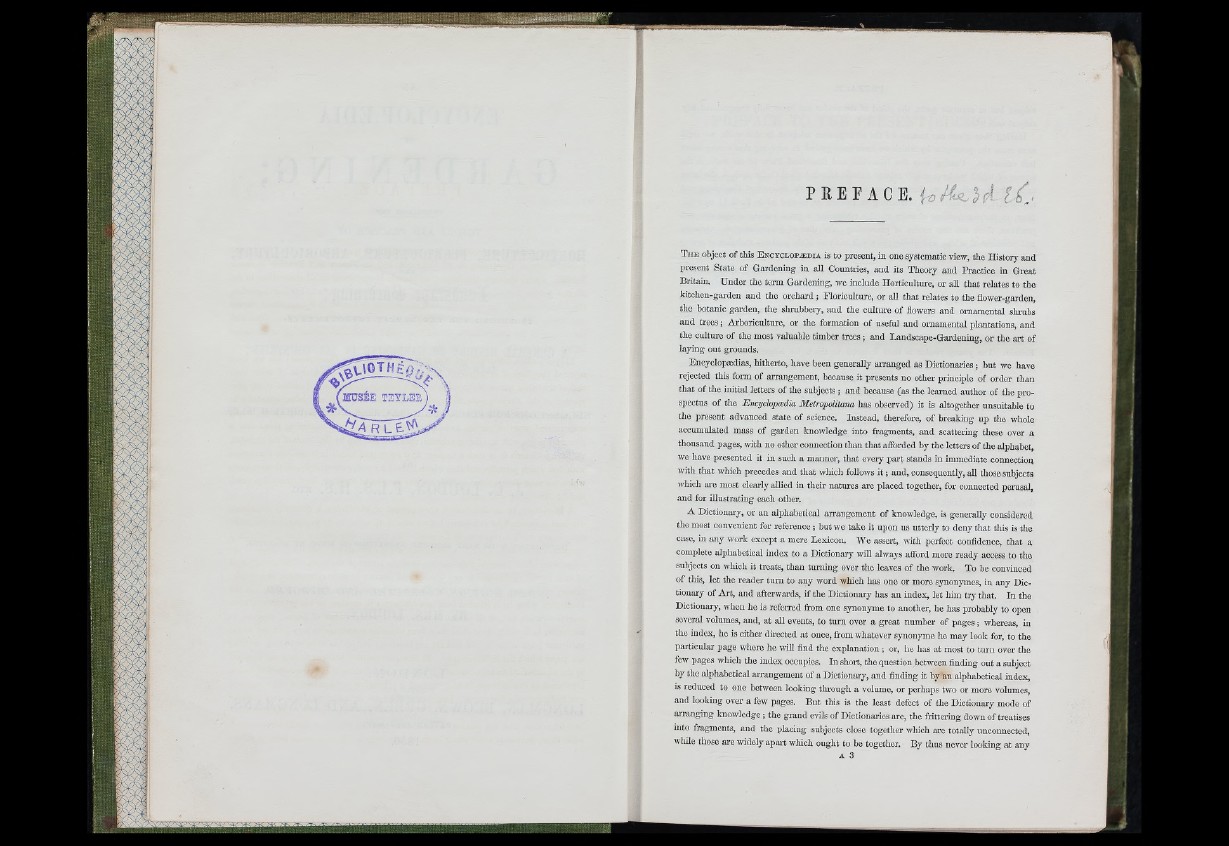
P R E F A C E . fC
T h e object of this E n c y c l o p í e d i a is to present, in one systematic view, the History and
present State of Gai'dening in all Countries, and its Theory and Practice in Great
Britain. Under the term Gai-dening, we include Horticultm-e, or all that relates to the
kitchcn-garden and the orchard j Eloricultui'e, or all that relates to the flower-garden,
the botanic garden, the shrubbeiy, and the culture of flowers and ornamental shrubs
and tre e s ; Arboriculture, or tbe formation of useful and ornamental plantations, and
the culture of the most valuable timber tre e s ; and Landscape-Gardening, or the a rt of
laying out grounds.
Encyclopasdias, hitherto, have been generally arranged as Dictionai-ies; but we have
rejected this form of arrangement, because it presents no other principle of order than
that of the initial letters of the subjects; and because (as the learned author of tbe prospectus
o f the Encyclopaedia Metropolitana has observed) it is altogether unsuitable to
the present advanced state of science. Instead, therefore, of breaking up the whole
accumulated mass of garden knowledge into fragments, and scattering these over a
thousand pages, with no other connection than that afforded by the letters of the alphabet,
we have presented it in such a manner, that every part stands in immediate connection
with that which precedes and that which follows i t ; and, consequently, all those subjects
which are most clearly allied in their natmres are placed together, for connected perusal,
and for illustrating each other.
A Dictionary, or an alphabetical arrangement of knowledge, is generally considered
the most convenient for reference ; but we take it upon us utterly to deny that this is the
case, in any work except a mere Lexicon. We assort, with perfect confidence, that a
complete alphabetical index to a Dictionary will always aflord more ready access to the
subjects on which it treats, than turning over the leaves of the work. To be convinced
of this, let the reader turn to any word which has one or more synonymes, in any Dictionary
of Art, and afterwards, if the Dictionaiy has an index, let him try that. In the
Dictionary, when he is referred from one synonyme to another, he has probably to open
several volumes, and, at all events, to tu rn over a great number of p age s; wlicreas, in
the index, he is either directed at once, from whatever synonyme he may look for, to the
particular page where he will find the explanation ; or, ho has at most to turn over the
few pages which the index occupies. In short, the question between finding out a subject
by the alphabetical an-angement of a Dictionary, and finding it by an alphabetical index,
is reduced to one between looking through a volume, or perhaps two or more volumes,
and looking over a few pages. But this is the least defect of the Dictionary mode of
aiTanging knowledge ; the grand eidls of Dictionaidcs are, the frittering down of treatises
into fragments, and the placing subjects close together which are totally unconnected,
whüe those arc widely apart which ought to be together. By thus never looking at any
A 3